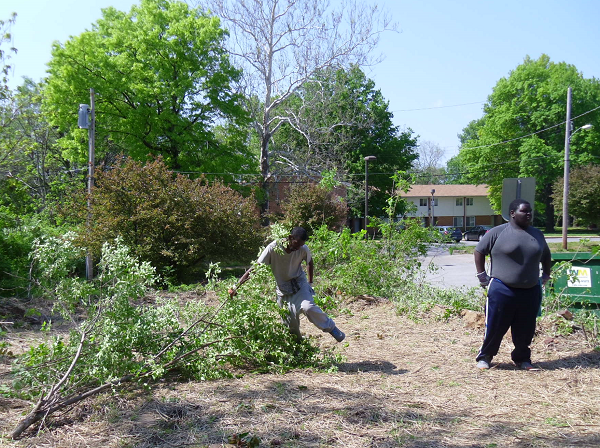| Back to Back Issues Page |
 |
|
Useful Community Plus March 19, 2020 |
Feature: Adapting Spring Clean-Ups to COVID-19, Feature: Maybe You Can Salvage Spring Community Clean-Ups Every year it seems that we tell you once or twice about the value of clean-up events in your neighborhood. This year will be different, depending on the status of the coronavirus pandemic where you live.
Every year it seems that we tell you once or twice about the value of clean-up events in your neighborhood. This year will be different, depending on the status of the coronavirus pandemic where you live.
To help contain the pandemic in your area, you need a strategy to allow a few individuals at a time to work on outdoor cleanup tasks at safe distances from one another. Instead of the half-day blitz that we advocate, your rolling clean-up may need to last weeks, with just one to five people working at a time. The organizational challenge skyrockets in comparison to the relatively simple one-day clean-up. To see if your cleanup is even feasible, begin by checking with your dumpster provider. If you can afford a monthly rental, this may be a good choice. Think creatively about alternatives for containing and storing your litter. Some of you won't be able to find a good solution and may have to cancel spring clean-ups altogether. (If so, take heart and just daydream about next year, using our links below.) If you adapt your program, your extra logistics will include signing up volunteers for specific time slots, orienting volunteers, assuring everyone is taking proper precautions, assigning tasks, and monitoring actual progress to assure that the next scheduled volunteers have meaningful tasks. This could be exhausting, but some community organizations will persist until they find workable solutions. For more specifics on how to organize particular types of clean-ups in more normal times, we would point you to the articles on our website that describe particular common types of clean-ups, often with visitor-contributed stories of how it worked for them: Cleaning up a neighborhood park or just a larger park in general If you're in one of those squeaky clean communities, see our ideas page for more possible group projects. Many of them will require sharp adaptations to allow for social distancing as well, but overcoming challenge will only strengthen community bonds. If You Have Blighted Neighborhoods, Look to This Town for InspirationSome of you live in shrinking cities or towns that are much less prosperous than they once were. Others live with a legacy of segregation, war, or natural disaster that have left people discouraged.Somehow we forgot to recommend an article we had noticed last year, which described an outstanding innovation team effort in Mobile, Alabama, USA, to address what is commonly called blight. This courageous team challenged everything from traditional code enforcement to state law. They even identified blight by using Instagram. The numbers don't lie; the number of blighted properties has been dramatically reduced. Incidentally, this nice explanation of blight, its genesis, and its impact on surrounding properties will be useful in explaining the importance of this topic to people who don't deal with urban issues every day and to newly elected officials. Check out the article from Fast Company. Making Better Regional and Neighborhood Transportation DecisionsTransportation thinking continues to evolve in the U.S. and elsewhere, as the dominance of the privately owned vehicle over every other form of transportation is challenged.Here are just a few good articles or talks that caught our eye this month: "A Swiss Lesson in Enlightened Street Design" from CityLab "Nine keys to safe downtown streets" from Congress on the New Urbanism (CNU) "4 ways to make a city more walkable", a TED Talk by important walkability leader Jeff Speck, also author of the article just above, and "Why the US Sucks at Building Public Transit", an outstanding article from VICE. Get in Tune with the Global PictureLastly, this month we want to move you to feel part of one world. To help you with that, we list some good resource articles. Begin with refreshing yourself on the United Nations Sustainable Development Goals to regain your global perspective.To stay hopeful, we need a starting point in addressing global poverty. An excellent resource from the Brookings Institution explains why worldwide focus on rural areas is what is necessary to move the needle on extreme poverty. Those of you who work with poverty in middle-income and higher-income countries will appreciate a scholarly article on what the authors call deep and extreme child poverty worldwide. If you aren't used to reading social science research, a squick can of this article will give you perspective about how your country compares with others. Lastly, we appreciated two articles about Africa specifically: one on what is necessary to get urbanization in Africa right and another another about how to meet Africa's youth employment crisis. Thanks to Brookings Institution for the best U.S.-based work on Africa issues. |
| Back to Back Issues Page |